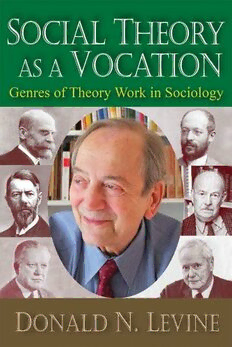
Social Theory as a Vocation: Genres of Theory Work in Sociology PDF
Preview Social Theory as a Vocation: Genres of Theory Work in Sociology
Copyright © 2015 by Transaction Publishers, New Brunswick, New Jersey. All rights reserved under International and Pan-American Copyright Conventions. No part of this book may be reproduced or transmitted in any form or by any means, electronic or mechanical, including photocopy, recording, or any information storage and retrieval system, without prior permission in writing from the publisher. All inquiries should be addressed to Transaction Publishers, 10 Corporate Place South, Piscataway, New Jersey 08854. www.transactionpub.com This book is printed on acid-free paper that meets the American National Standard for Permanence of Paper for Printed Library Materials. ISBN: 978-1-4128-5502-0 Printed in the United States of America Contents List of Figures vii Preface ix Acknowledgments xiii Prologue: Social Theory as a Vocation xvii Part I Custodial Theory Work 1 Note on Park, The Crowd and the Public 3 2 Max Weber’s 1908 Note Regarding Simmel 9 3 Review of the Variorum Edition of Max Weber’s Economy and Society 17 4 Taking the Measure of Auguste Comte 21 5 Émile Durkheim, Univocalist Manqué 27 6 Robert K. Merton On and In Ambivalence 43 7 Revisiting Georg Simmel 55 8 Simmel’s Stranger and His Followers 71 9 Simmel and Parsons Reconstructed 87 Part II Heuristic Theory Work: Internal to the Discipline 10 The Concept of Cultural Integration 107 11 The Organism Metaphor in Sociology 123 12 The Concept of Rationality: From Kant to Weber 143 13 Rationality and Freedom, Weber and Beyond 163 14 P utting Voluntarism Back into a Voluntaristic Theory of Action 179 15 “ Ambiguity and Modernity”: Engaging a Serendipitous Problem 197 16 Somatic Elements in Social Conflict 225 17 R econfiguring Ethiopia’s Nationhood in a Global Era 239 Part III Heuristic Theory Work External to the Discipline 18 S immel as a Resource for Sociological Metatheory 253 19 Sociology after MacIntyre 271 20 I mages and Assumptions in a Scholarly Domain: Ethiopian Studies 279 21 M issed Opportunities as a Diagnostic Issue: Ethiopia, 1960–2005 291 22 A Problem of Collective Identity 313 23 Modernity and Its Endless Discontents 323 24 Crises in Liberal Education 343 Appendixes A Syllabus: American Sociological Theory, 1900–1980 357 B Syllabus: Perspectives on Modern Social Theory 361 C Syllabus: The Forms and Functions of Social Knowledge 365 D Syllabus: Organizations of the Social Sciences 367 E Organizing a Practicum in Social Theory 369 References 373 Index 395 List of Figures Figure P1. An Agenda of Theory Work in Sociology xxviii Figure 8.1. A Typology of Stranger Relationships 80 Figure 8.2. A Paradigm for the Sociology of Strangers 81 Figure 12.1. Objectified Rationality in Three Institutional Spheres 158 Figure 12.2. The Various Meanings of Rationality in Weber’s Work 159 Figure 15.1. The Functions of Ambiguous Discourse 214 Figure 15.2. The Functions of Univocal Discourse 214 Figure 17.1. The Ethiopian Diaspora, 1973–2003: First-Generation Immigrants 245 Figure 21.1. Modernity Revolutions and Their Effects 293 Figure 21.2. Issues and Openings 300 Figure 21.3. Three Factors Leading to Sub-optimal Outcomes 307 Figure 23.1. Conceptions of Modernity: Essential Processes 325 Figure 23.2. The “Revolutions” and the Benefits of Modernity 332 Figure 23.3. The Modern Revolutions and Their Associated Discontents 332 Figure 23.4. The Hallmarks of Modernity in Action Theory Terms 337 Figure 24.1. Notions of General Education: 1900–1950 354 vii Preface “A course in what? American sociological thought?” For summer 1996 I was invited to create such a course for a class of Japanese students coming to the University of Chicago as part of a master’s program in the humanities. I was taken aback. Didn’t the authorities know that the social theorists who deserved to be reckoned as authors of our humanistic classics were Durkheim, Simmel, and Weber and that, relatedly, most other figures in that list, whom I was then recovering for The Heritage of Sociology series—figures such as Max Scheler, Norbert Elias, Maurice Halbwachs, Marcel Mauss, and Martin Buber—were not Americans? No matter, they replied. This initiative formed part of an effort to respond to the interest of the Japanese students in getting bet- ter acquainted with American culture. To me, conceiving American sociological theorists as forming a tradition distinctive of American culture—that was new. I had never taught such a course and doubted that anyone else had either. Accepting the challenge, I supplemented my knowledge of mid-nineteenth-century American social theorists with refresher work on earlier authors. The task was eased by returning to authors featured by Morris Janowitz when he founded The Heritage series in the late 1960s—Thomas, Park, Wirth, and others; by my own turn to American authors to include in The Heritage series (Hughes and Cooley; Sorokin, Lazarsfeld, and Merton); and by work on some early American figures in my Visions of the Sociological Tradition (1995). The curriculum thus assembled seemed plausible to me and of interest to the students from Japan—sufficiently so that I was invited to repeat the course in Tokyo in autumn 1997.1 Between those dates, I chaired the ASA Theory Section, “which prompted me” to reflect on how, without thinking much about it, I had styled my course: American Sociological Thought, 1900–1980. It had just seemed natural to make the cutting-off point of the course a year following the death of Talcott Parsons. But that date soon came to signify an increasingly problematic ix
